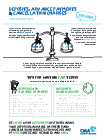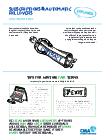How to write fair contracts: information for businesses
How to make sure your business’ terms and conditions are fair, and avoid unfair contract terms
Introduction
Businesses that deal with consumers need to make sure their contract terms are fair.
The Consumer Rights Act 2015 aims to protect consumers against unfair contract terms and notices.
For the purpose of this guide we often use the word ‘you’ to refer to the business and ‘customer’ to mean consumer.
Every business is different, answer a few simple questions to see what aspects of fair terms laws are relevant to your business.
An unfair term is not legally binding on your customer. Enforcers can also take action to stop you using it.
For a more detailed breakdown of the information see:
What is unfair?
Generally, contract terms and notices are unfair if they put the customer at an unfair disadvantage. The law applies a fairness test that starts by asking whether the wording used tilts the rights and responsibilities between the customer and the trader too much in favour of the trader.
The test is applied by looking at the words and how they could be used. It takes into consideration what is being sold, how a term relates to other terms in the contract and all the circumstances at the time the term was agreed.
Some of your terms may be exempt from the fairness test – namely, those describing the main subject matter and setting the price, provided these are clear and prominent. There is also an exemption for wording covered by law or rules, for example words that legally have to be used.
Certain terms and notices are blacklisted by legislation as unsuitable for use with consumers in any circumstances. These terms can be challenged on that basis, without needing to prove that they fail the fairness test.
How fair are your consumer contract terms? Take the quiz to find out.
Common myths about contract terms
Just because terms are written and signed, it doesn’t make them legal.
A contract term and notice has to be fair to be legally binding on your customer. If it isn’t, they can challenge it – including in court if necessary. Enforcers (such as the CMA and Trading Standards) can also bring cases to stop you using it.
For a more detailed breakdown of the information see:
Top tips when writing your contract terms
When writing your terms, put yourself in your customers’ shoes. Think about how they might read and access them.
For a more detailed breakdown of the information see:
Deposits, advance payment and cancellation charges
Deposits are a customer’s way of reserving your goods or services. Advance payments help you to pay your business’s actual costs during a contract.
If your customer cancels and it’s not your fault, you’ve got the right to protect yourself, but what you keep must take into account what your business is actually losing as a result. It must not be excessive.
A term saying no refund is available in any circumstances is likely to be unfair. Where there is no fault by your customer and the contract is ended by you, your customer may well have a right to a refund.
For a more detailed breakdown of the information see:
Excessive charges and disproportionate sanctions
Terms that allow you to impose disproportionately high charges on your customers for breach of contract are likely to be unfair.
There is unlikely to be any objection to terms which, in plain language, make your customers pay for the financial losses that they have directly caused where they are at fault.
Another kind of financial sanction that could be unfair includes imposing a disproportionate cancellation charge on your customer if they decide to pull out of the contract early.
Other kinds of over-severe sanctions may also be unfair. For example, terms that allow you to use an enforcement method which could lead to a violation of your customer’s privacy or property rights.
For a more detailed breakdown of the information see:
Cancelling a contract: when and how
You may want to include terms in your contract that allow both you and your customer legitimate reasons for bringing the contract to an end.
However, if you cancel a contract you could leave your customer with significant problems and potentially facing costs. If this is the case, then a term which allows you to cancel the contract whenever you like is likely to be considered unfair, even if you provide refunds of any advance payments.
Your terms should not give your business excessive rights to cancel a contract, and your customer should not be unduly restricted should they wish to do the same.
What is said in this guide assumes that there are no special statutory provisions which give consumers cancellation rights, for example, those which arise in ‘distance’ or ‘off premises’ contracts.
For a more detailed breakdown of the information see:
Responsibility if things go wrong
Terms which allow you to remove or limit your liability to your customers when you are at fault and things go wrong are likely to be unfair. This includes terms that prevent or hinder your customer from seeking redress (eg compensation) when you are at fault.
The law singles out terms that take away or reduce your customer’s statutory rights. They can be described as being blacklisted because these terms are never enforceable against your customers.
What are statutory rights?
Statutory rights include requirements that:
- goods must match the description given to them
- be of satisfactory quality and fit for a particular purpose
- services must be carried out with ‘reasonable skill and care’
For more information about what your customer’s statutory rights are (including those relating to digital content) and detail on blacklisted terms see Part 4 of the CMA’s main guidance.
For a more detailed breakdown of the information see:
Changing the terms of a contract
If you have a term that gives you the right to change elements of a contract after it has been agreed with your customer, this is known as a variation clause. You might try to use this type of term to adapt a long-term contract if the circumstances around it change.
Variation clauses are likely to be unfair if they have the effect of a ‘blank cheque’, allowing you to adjust an agreed price at your discretion, or to change other important agreed aspects of the contract to suit yourself.
A term that gives you the right to make changes regardless of the consent of your customer may also be blacklisted in some circumstances by legislation. These terms may be challenged on that basis, without needing to prove that they have failed the fairness test.
For a more detailed breakdown of the information see:
Subscriptions and automatic rollovers
Your customer needs to know how long their contract is due to run and how to cancel it (if they don’t want it renewed).
Terms that can be used to extend a contract beyond what your customer would normally expect may be unfair. The effect of these types of terms is to potentially tie customers into paying for something which they no longer want or need.
For a more detailed breakdown of the information see:
For further information on these types of terms, see the CMA’s full guidance on unfair contract terms.
Please note, the information on these web pages are not a substitute for the legislation itself or for seeking independent legal advice. They provide an introduction to the CMA’s views, but it is ultimately for the courts to apply and interpret the legislation.








